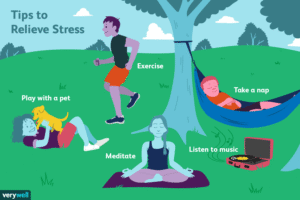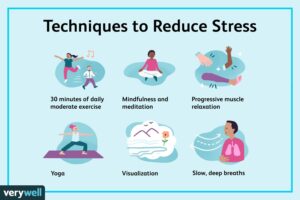Stress is an understandable response to certain demands, but prolonged exposure can have serious repercussions for mental and physical health. Find out how stress management techniques and strategies can help us live healthier, happier lives.
Exercise, time management, social support and therapy are proven methods for relieving stress. Other effective tools may include practicing mindfulness, gratitude and healthy sleep practices.
1. Change Your Perspective
Shifting your perspective can help reduce and manage stress. Your approach to viewing life determines how you react in different situations.
Learn to recognize when you’re engaging in negative and stress-inducing patterns of thinking. Engaging in positive self-talk can help reframe and challenge negative thoughts; practicing gratitude may also keep things in perspective and can help keep change at bay; seeking outside assistance may also be useful; trained neuroscience-based coaches or counselors can offer advice and techniques for altering perspectives.
2. Get Support
Stressful times may come and go, but long-term stress can have serious repercussions for health. A strong support network can help you through challenging times while managing your stress levels more effectively.
Daily stressors range from work pressures and financial worries, to relationship tensions. Any of these can trigger your body’s “fight or flight” response and lead to symptoms like tightened muscles and increased heart rate. Consulting a therapist may give you tools for more effectively dealing with such situations; in-person visits or online services like BetterHelp are great places to find one.
3. Practice Self-Care
Self-care can be challenging, yet essential for maintaining mental health. Activities that support this could include exercise, getting enough restful sleep and eating healthily.
Mental stimulation includes activities that stimulate your mind, such as reading, learning a new skill or doing brain teasers – activities which have proven useful in increasing mood and energy levels.
Learning stress-relief techniques is important, especially as stressors become unavoidable in everyday life. Minimizing their effects will make you more resilient to cope with life’s obstacles.
4. Change Your Environment
People, habits and places surrounding us can either foster our energy or sap it away – yet often these influences go undetected.
Establishing a relaxing environment can be key to managing stress effectively. Try organizing your space to give a sense of control, setting sleep-friendly routines, improving home air quality and eliminating barriers that prevent healthy behaviors from taking root in the first place. Although changing surroundings can be daunting at times, just focusing on one or two small changes at a time can have dramatic results that improve both mood and energy – take it step by step and you’ll reach success soon enough!
5. Change Your Diet
Stressful situations can put undue strain on the body and result in physical ailments like headaches, stomach aches and weight gain. Stress also raises risks of heart disease, diabetes and reduces immune functioning – potentially making these issues even worse!
One way to effectively combat chronic stress is through eating healthier. Try tracking your food for a short period of time to observe which types of foods affect your mental wellbeing; eating fish may reduce spikes in hormones that trigger hunger and cravings while drinking black tea can lower levels of cortisol.
6. Exercise
Most people know that exercise can benefit their physical wellbeing, but did you also know it can improve mental wellbeing as well? Exercising can reduce the impact of stressors such as anxiety and help prevent future ones from appearing altogether.
Exercise can boost feel-good endorphins and provide much-needed distraction from day-to-day stresses. Make physical self-care practices part of your weekly schedule; finding an exercise partner may help to increase motivation and accountability.
7. Get Enough Sleep
Stressful circumstances can contribute to health issues, but adequate restful sleep can provide relief. A restful night of zzz’s can lower your risk for depression and anxiety significantly.
Sleep can help you to feel more relaxed, while improving your ability to concentrate and pay attention. Aim for 7-9 hours of quality restful sleep each night; if this proves challenging, try relaxation techniques such as Tai Chi or Yoga; also avoid stimulants like caffeine and alcohol prior to going to bed.
8. Relax
Relaxation techniques can help alleviate stress by activating your body’s relaxation response – the opposite of its “fight or flight” reaction. Relaxation techniques such as meditation, yoga and deep breathing have been shown to decrease blood pressure, heart rate and increase natural killer cell counts that fight cancer symptoms. Studies also indicate this practice helps lower blood pressure and heart rate levels as well as increase levels of natural killer cells and antibodies that combat them.
Relaxation doesn’t necessarily involve just sitting still; it can involve gentle physical activity like taking a stroll at your own pace, using your senses to engage scent, sight, touch and sound as well.
9. Get a Good Night’s Sleep
Sleep can be an effective natural stress reliever. Additionally, it helps manage emotions and improve communication among others.
Prioritize sleep by setting a regular bedtime and wake time. Avoid blue light before sleeping, and develop a soothing bedtime ritual such as reading, taking a hot bath, listening to music, or stretching gently before bed.
10. Take a Break
Resetting your motivation, improving focus, and productivity. Also providing time to process emotions and gain perspective.
Include activities such as deep breathing and progressive muscle relaxation into your breaks to help alleviate stress levels. Or take a short walk or engage in other forms of physical self-care to alleviate tension.
Finding a balance between work and medical needs is essential for those suffering from mental illness. Be sure to openly communicate with your employer and enlist their support as necessary.




